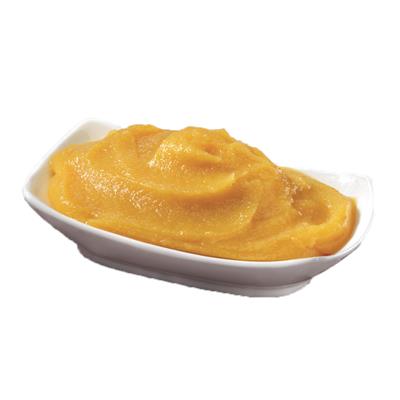Shiro White Miso 500g, ea
Item No.
150.500.036
Elaborated in a traditional way, it has a discreet and light sweet taste followed by a miso flavour. Its sweet taste stays very long even after the disappearance of the miso flavor. It has a denser flavor with a hint of chestnut blossom. White miso is a special miso developed with a focus on
Description
Elaborated in a traditional way, it has a discreet and light sweet taste followed by a miso flavour. Its sweet taste stays very long even after the disappearance of the miso flavor. It has a denser flavor with a hint of chestnut blossom.
White miso is a special miso developed with a focus on sweetness, while other miso have been developed for preservation. White miso has a salt content equal to one third of that of normal miso.
It uses twice as much koji rice as the usual miso to obtain a delicate sweetness. Its fermentation method is also different: it does not use yeast for its fermentation to give a delicate flavor with a sweet note of soy.
Fabulous for making "shiro miso"miso soup. Usually used for sweet type miso soup and zoni, and as an ingredient for miso dengaku or miso vinegar. It contains less salt (about 5%) and can be mixed with other miso to soften the taste of miso soup. To be served in traditional miso soup with diced tofu, chives or chopped spring onion.
White miso is also amazing for marinating meats and fish (an enzyme called protease found in Saikyo miso turns protein ingredients into amino acids such as glutamic acid and glycine and makes fish and meat delicious). It is necessary to marinate 12 to 24 hours.Salt contains a significant amount of minerals that make miso rich and tasty.By mixing with sweet ingredients, white miso reveals its sweetness.
It goes well with dairy products such as milk and cheese. It has greater heat resistance and can therefore be used for simmering. If the temperature is too high, the Maillard sugar reaction occurs and becomes brown and bitter, and when stored at over 25°C, the miso protein also turns brown due to the Maillard reaction, which leads to the degradation of miso quality and a decrease in flavor.
White miso is a special miso developed with a focus on sweetness, while other miso have been developed for preservation. White miso has a salt content equal to one third of that of normal miso.
It uses twice as much koji rice as the usual miso to obtain a delicate sweetness. Its fermentation method is also different: it does not use yeast for its fermentation to give a delicate flavor with a sweet note of soy.
Fabulous for making "shiro miso"miso soup. Usually used for sweet type miso soup and zoni, and as an ingredient for miso dengaku or miso vinegar. It contains less salt (about 5%) and can be mixed with other miso to soften the taste of miso soup. To be served in traditional miso soup with diced tofu, chives or chopped spring onion.
White miso is also amazing for marinating meats and fish (an enzyme called protease found in Saikyo miso turns protein ingredients into amino acids such as glutamic acid and glycine and makes fish and meat delicious). It is necessary to marinate 12 to 24 hours.Salt contains a significant amount of minerals that make miso rich and tasty.By mixing with sweet ingredients, white miso reveals its sweetness.
It goes well with dairy products such as milk and cheese. It has greater heat resistance and can therefore be used for simmering. If the temperature is too high, the Maillard sugar reaction occurs and becomes brown and bitter, and when stored at over 25°C, the miso protein also turns brown due to the Maillard reaction, which leads to the degradation of miso quality and a decrease in flavor.


